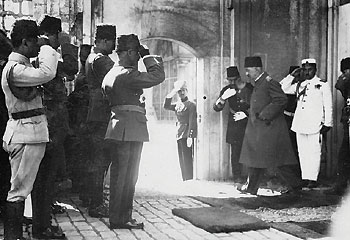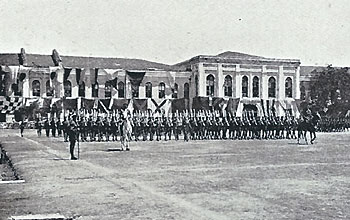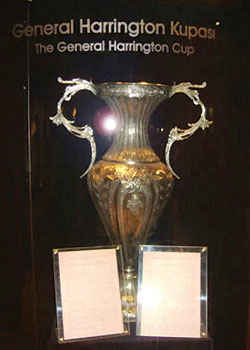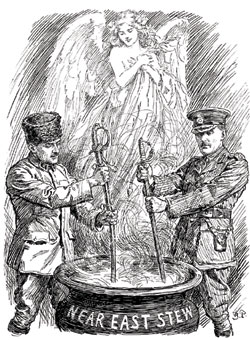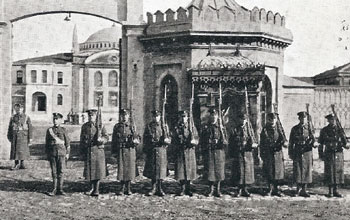Home | About Us | Subscribe | Advertise | Other Publications | Diary | Offers | Gallery | More Features | Obituaries | Contact |
|
|
|
|||||||||
During The Great War Turkey was allied to Germany. At the Paris Peace Conference in 1919 the Allies set about dismantling the Ottoman Empire, and parts of Turkey were placed under Greek control. This was unacceptable to the Turks and they raised an army to drive the Greeks out. The British, French and Italians agreed to send an international force to safeguard the neutrality of Constantinople (now Istanbul) and the Bosphorus Straits. The Allied forces were confronted by the Turkish nationalists at Chanak. The Prime Minister, Lloyd George, had lost the confidence of the Conservative Party (1922 Committee) for his handling of the affair and resigned on 20th October 1922. In the same month, British forces were reinforced by 1st Guards Brigade consisting of 2nd Battalion Grenadier Guards, 3rd Battalion Coldstream Guards, and 1st Battalion Irish Guards stationed in Constantinople.
The Commander of British Forces in Turkey at that time, Lieutenant General Sir Charles Harington, wrote: ‘I was the goal keeper of a ring around Constantinople and I had issued an ultimatum that no-one was allowed to shoot at my goal’. A Central Visual Signalling Station was established connecting GHQ, the Mediterranean Fleet, and land stations either side of the Bosphorous. It operated by day and night and Captain John Prescott, Grenadier Guards, maintained that his signallers sent messages by semaphore and heliograph so fast that the naval signallers asked them to slow down. The crisis subsided and the Guardsmen settled into the normal life of an overseas garrison. The Mashlak Hunt Club north of the city was keenly supported by officers of the brigade.
On 2nd June 1923, the King’s Birthday Parade was held in Taksim Stadium, the square of an old Turkish barracks used for football matches and sport. It was decorated by the Royal Navy with thousands of flags. The King’s Colour of 1st Battalion Irish Guards was trooped. Harington, who took the salute, wrote of his ‘admiration of the Guards’ system of thoroughness and perfection. In that parade I saw the secret of their success, the secret of their great record and traditions’. He had also seen RSM R Beard, Grenadier Guards, taking notes at a rehearsal and asked him after the ceremony, what notes he had taken. His reply was ‘No names in the book today, Sir, it was just perfect’. Two days later, 1st Guards Brigade held their athletics meeting. The challenge cup was won by the Irish Guards with their Commanding Officer, Alexander, leading the Mile Team Race from start to finish. The Coldstream Guards won the Tug-of-War. Fenerbaçhe Sports Club believes that a combined Foot Guards team challenged the Turks to a football match, which took place in the Taksim Stadium on 29th June. The club was founded in 1907 and had been secretly moving guns and ammunition by small boats to the nationalists in Anatolia from its club building near Kurbağalidere (Froggy Creek). The club maintains that Harington invited Lord Plumer, the Governor of Malta and his former commander in The Great War, to watch the game which Fenerbaçhe won 2-1. For the Turks it represented a symbol of a victory against invading forces and the Harrington (sic) Cup is displayed in the Fenerbaçhe Museum. However, the match is not mentioned, either in Harington’s memoirs, Tim Harington Looks Back (1940), or in contemporary editions of The Household Brigade Magazine.
On 24th July, the Lausanne Treaty between Turkey and the Allies was signed. Relations between the Allies and the Nationalists had survived the strain of dual control and compliments were exchanged. The evacuation of Constantinople by Allied troops took place without a hitch. On 5th September, 1st Battalion Irish Guards embarked on HMHT Egypt and sailed for their next posting in Gibraltar. At the final departure ceremony on 2nd October, crowds of Turks applauded the impressive bearing of the Guard of Honour of 100 Guardsmen. The combined Corps of Drums played Turkish nationalist songs and the British National Anthem. Harington, GHQ and the remainder of 1st Guards Brigade embarked on the White Star Liner SS Arabic. At a concert on the voyage home to Southampton, RSM Haymon, Coldstream Guards sang two comic songs Football and Roses and Radishes. Harington, whose subtle and tactful statesmanship had been instrumental in averting war between the United Kingdom and pre-republic Turkey, was satisfied that the goal of ‘Peace in the Near East’ had been reached without a shot being fired in anger. He concluded: ‘None but the best troops could have done so’. Reflecting on his responsibilities he wrote: ‘There is one thing about Constantinople, and that is that nothing happens as one expects’.
|
|||||||||
|
|||||||||

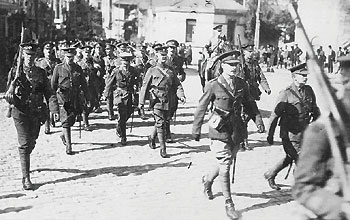 3rd Battalion Coldstream Guards entering Constantinople on 10th October 1922
3rd Battalion Coldstream Guards entering Constantinople on 10th October 1922